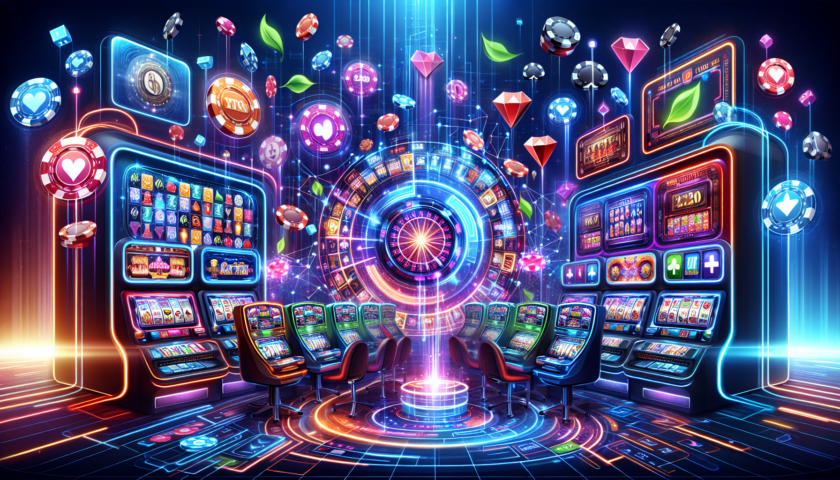Online gaming has evolved rapidly, shifting from a niche hobby to a global phenomenon. With the rise of gaming platforms like Steam, Xbox Live, PlayStation Network, and mobile app stores, the gaming industry has seen exponential growth. However, the future of online gaming platforms is poised for an even greater transformation, driven by innovations such as artificial intelligence (AI), cloud gaming, and enhanced social connectivity. In this article, we’ll explore these cutting-edge technologies and how they are shaping the next era of Hoki805 online gaming.
1. Artificial Intelligence: A Game Changer in Player Experience
AI’s impact on online gaming platforms goes beyond improving in-game characters and NPCs (non-playable characters). Today, AI is being used to personalize gameplay experiences, making them more dynamic and immersive. One of the most intriguing uses of AI in online gaming is procedural content generation (PCG), which uses algorithms to create game levels, environments, and narratives that are unique to each player. This not only enhances replayability but also ensures that no two gaming sessions are the same.
Additionally, AI-powered matchmaking is improving how players connect with others. Traditional matchmaking systems rely on basic criteria like skill level or player rank. However, AI can analyze players’ behavior, preferences, and playstyles to create matches that are not only balanced but also fun and engaging. This leads to a more satisfying multiplayer experience, reducing the frustration of unfair matches or unbalanced teams.
2. Cloud Gaming: Breaking the Barriers of Hardware Limitations
Cloud gaming platforms like Google Stadia, NVIDIA GeForce Now, and Xbox Cloud Gaming are revolutionizing the accessibility of games. Traditionally, gaming has required powerful hardware, such as high-end PCs or consoles, to run graphically intensive games. However, cloud gaming allows players to stream games directly from remote servers, bypassing the need for expensive hardware.
This shift makes high-quality gaming accessible to a broader audience, including those who may not afford a powerful gaming PC or console. Additionally, cloud gaming eliminates the need for game downloads or installations, allowing players to dive into their favorite games instantly. It also makes cross-platform gaming more feasible, as players can seamlessly switch between devices—whether it’s a PC, console, or smartphone—without losing progress or quality.
The future of cloud gaming is also closely tied to the advancement of 5G technology. With ultra-low latency and faster speeds, 5G networks will further enhance the experience, providing smooth, lag-free gameplay even for fast-paced, competitive titles. This will open up new opportunities for esports and competitive gaming, allowing players to participate in global tournaments without the constraints of traditional hardware.
3. Social Connectivity: The Rise of Virtual Worlds and Social Play
The role of social interaction in online gaming has always been significant, but it’s evolving into something far more immersive. Platforms like Discord, Twitch, and YouTube Gaming have transformed gaming into a social experience, where players can not only game but also watch, chat, and engage in communities around their favorite titles.
The next step in this evolution is the creation of vast virtual worlds that serve as spaces for socializing, working, and even living. Platforms like Fortnite and Roblox are already at the forefront, offering environments where players can interact beyond just gaming. These platforms allow for concerts, movie screenings, virtual shopping, and more—turning them into dynamic, multi-purpose social hubs.
Metaverse platforms are also emerging, promising an interconnected universe of games, social spaces, and digital goods. In these digital ecosystems, players can create and customize their own avatars, attend events, collaborate on projects, and even earn rewards through their social interactions. This interconnected social gaming space could lead to a more communal gaming experience, where personal connections and shared experiences are just as important as the gameplay itself.
4. The Future of Game Development: Collaborative Platforms and User-Generated Content
As gaming platforms become more advanced, game development is also becoming increasingly democratized. Tools like Unity and Unreal Engine enable independent developers to create sophisticated games without needing large studios or budgets. This is empowering a new generation of game designers, who are creating innovative and experimental gaming experiences.
Moreover, many online platforms are leaning into user-generated content (UGC) as a way to keep games fresh and engaging. Games like Minecraft and Fortnite have thrived by giving players the ability to create their own maps, skins, and content, which can be shared with the community. In the future, we’ll see more platforms enabling creators to monetize their UGC, blurring the lines between game developer and player.
